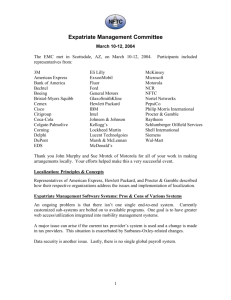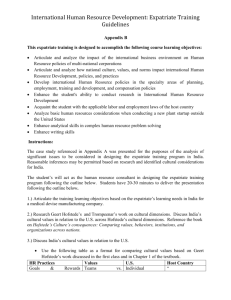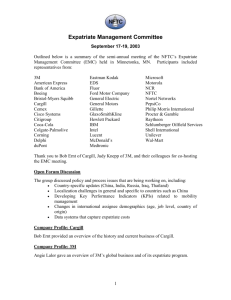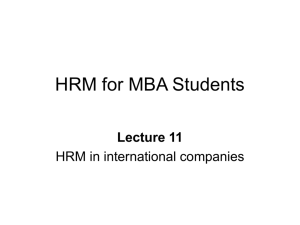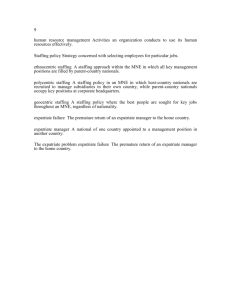Document 13317334
advertisement
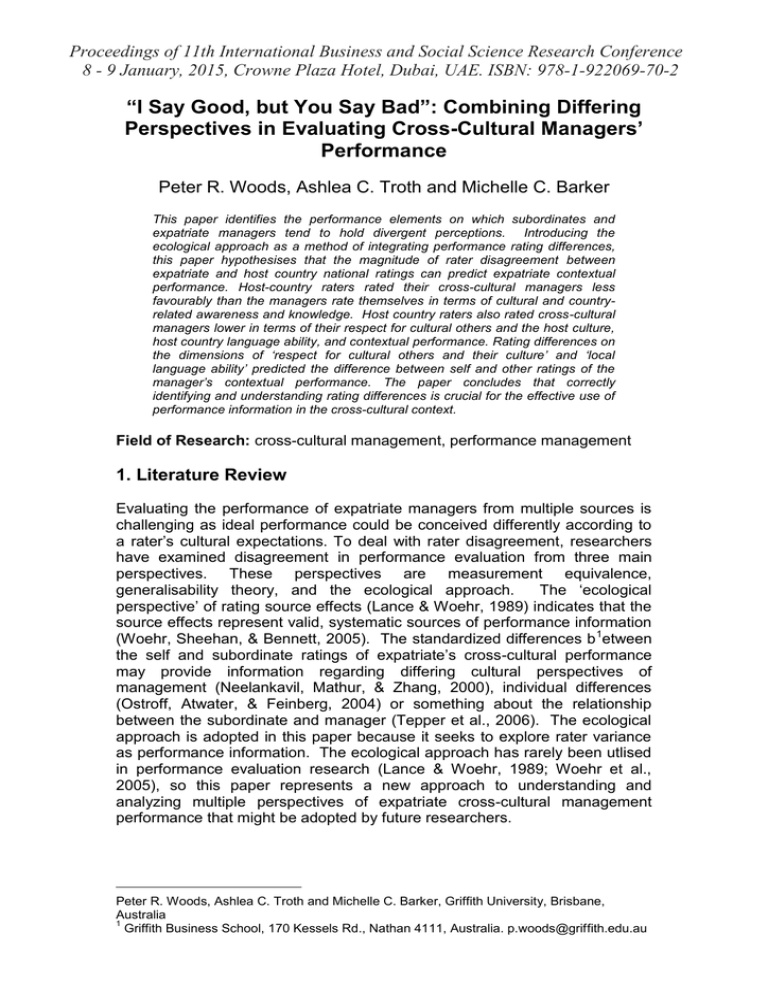
Proceedings of 11th International Business and Social Science Research Conference 8 - 9 January, 2015, Crowne Plaza Hotel, Dubai, UAE. ISBN: 978-1-922069-70-2 “I Say Good, but You Say Bad”: Combining Differing Perspectives in Evaluating Cross-Cultural Managers’ Performance Peter R. Woods, Ashlea C. Troth and Michelle C. Barker This paper identifies the performance elements on which subordinates and expatriate managers tend to hold divergent perceptions. Introducing the ecological approach as a method of integrating performance rating differences, this paper hypothesises that the magnitude of rater disagreement between expatriate and host country national ratings can predict expatriate contextual performance. Host-country raters rated their cross-cultural managers less favourably than the managers rate themselves in terms of cultural and countryrelated awareness and knowledge. Host country raters also rated cross-cultural managers lower in terms of their respect for cultural others and the host culture, host country language ability, and contextual performance. Rating differences on the dimensions of ‘respect for cultural others and their culture’ and ‘local language ability’ predicted the difference between self and other ratings of the manager’s contextual performance. The paper concludes that correctly identifying and understanding rating differences is crucial for the effective use of performance information in the cross-cultural context. Field of Research: cross-cultural management, performance management 1. Literature Review Evaluating the performance of expatriate managers from multiple sources is challenging as ideal performance could be conceived differently according to a rater‟s cultural expectations. To deal with rater disagreement, researchers have examined disagreement in performance evaluation from three main perspectives. These perspectives are measurement equivalence, generalisability theory, and the ecological approach. The „ecological perspective‟ of rating source effects (Lance & Woehr, 1989) indicates that the source effects represent valid, systematic sources of performance information (Woehr, Sheehan, & Bennett, 2005). The standardized differences b 1etween the self and subordinate ratings of expatriate‟s cross-cultural performance may provide information regarding differing cultural perspectives of management (Neelankavil, Mathur, & Zhang, 2000), individual differences (Ostroff, Atwater, & Feinberg, 2004) or something about the relationship between the subordinate and manager (Tepper et al., 2006). The ecological approach is adopted in this paper because it seeks to explore rater variance as performance information. The ecological approach has rarely been utlised in performance evaluation research (Lance & Woehr, 1989; Woehr et al., 2005), so this paper represents a new approach to understanding and analyzing multiple perspectives of expatriate cross-cultural management performance that might be adopted by future researchers. Peter R. Woods, Ashlea C. Troth and Michelle C. Barker, Griffith University, Brisbane, Australia 1 Griffith Business School, 170 Kessels Rd., Nathan 4111, Australia. p.woods@griffith.edu.au Proceedings of 11th International Business and Social Science Research Conference 8 - 9 January, 2015, Crowne Plaza Hotel, Dubai, UAE. ISBN: 978-1-922069-70-2 In understanding how to integrate relevant raters from different cultural and positional perspectives in cross-cultural management performance, it is useful to examine the reasons for rater disagreement in the specific context of expatriate cross-cultural management. There are three main reasons for rater disagreement in the context of expatriate cross-cultural management performance evaluation and these are invalid performance criteria, rater competence and rater bias. The issue of invalid performance criteria has been outlined in Woods (2003; 2004) and so will not be explored here. Rating differences caused by rater bias include: different cultural constructs of management concepts among raters (Bass, 1997; Neelankavil et al., 2000); rater perception of the purpose of appraisals (Marshall & Wood, 2000; Milliman, Nason, Zhu, & DeCieri, 2002; Scheider, 1988); ethnic and racial stereotypes (Ilgen, Barnes-Farrell, & McKellin, 1993); management positional level in the organization hierarchy (Borman, 1997); gender bias (Chung, 2001); and cultural expectations of leadership (Hempel, 2001; Milliman et al., 1998; Selmer, 1997). In the expatriate context, these biases can usually be attributed to particular rater groups such as managers, or men, or raters from a national group. Overall, these biases are generalisable, which is relevant to ratings integration. Rating differences caused by rater competence include: language difference (Harzing, 2002); amount and type of contact between rater and ratee (Black, Gregersen, & Mendenhall, 1992); differing understanding or perception of rating processes and underlying rating concepts (Cheung, 1999); and accuracy of self-perceptions (Yammarino & Atwater, 1993). In the expatriate context, problems with rater competence could be alleviated with better training of the rater, or an improved rating process. Examples of this include providing host country nationals with a rating form in the host country language or training staff in self-awareness with regard to self-rating. 2. Research Framework Most of the previous research on inter-rater integration has focused on rater similarities rather than rater differences (Tepper et al., 2006). The method of analysis for previous research, therefore, is based on inter-rater correlations, rather than the use of t-tests or difference scores used in this current research. It is important to note that statistically the analysis of differences (i.e. t-tests) or similarities (correlations) are essentially assessing the same question. Rather it is the conceptualization or reasoning that occurs in terms of „similarity‟ or „differences‟ that is distinct. The research that has been conducted comparing performance evaluations by self-raters and subordinates have often shown the inter-correlations among raters tend to be small with Pearson correlation scores of less than .30. Mount (1984) reported self-subordinate correlations of .19. Conway and Huffcutt (1997) reported self-subordinate correlations of .14 while Shay (1999) reported an expatriate manager and host country subordinate correlation average of .14. With regards to the relative ratings between managers and subordinates, Shay (1999) and Shay and Tracey (1999) administered the 11 factor managerial practices survey (Yukl, 1998) to 200 managers in the expatriate context and found that expatriates tended to rate their performance more highly than their Proceedings of 11th International Business and Social Science Research Conference 8 - 9 January, 2015, Crowne Plaza Hotel, Dubai, UAE. ISBN: 978-1-922069-70-2 host country national subordinates did. The instrument in Shay‟s (1999) study was not specifically designed to assess cross-cultural management or capture aspects of cross-cultural management performance. Nevertheless, it is expected that managers in the current study will also perceive themselves more favourably than their host country subordinates. In particular it is expected that managers will rate their open-mindedness and flexibility higher than host country nationals based on the findings of Van der Zee and Van Oudenhoven (2000). A more sober assessment by host country nationals is also expected of the expatriate‟s cross-cultural awareness and local business knowledge. Host country nationals would normally have a much greater knowledge of local culture and business conditions, so they may use this as a reference point in judging the expatriate on these dimensions (Hempel, 2001; Selmer, 1997; Yammarino & Atwater, 1993). It is expected that a different pattern of performance elements will emerge as salient when the difference scores of self and other (i.e. the extent to which perceptions of performance differ) are used to predict perceptual differences regarding managers contextual performance. The difference scores enables expatriate performance to be examined at the dyadic level of analysis and tap into the extent host country nationals and expatriate managers perceptions differ in terms of the performance elements and what this means for the managers performance. Thus, the utilization of absolute difference scores as an integration method will provide unique information that is relevant to crosscultural management performance. Hypothesis: That the integration of host country nationals in expatriate performance evaluation reveals unique information that is relevant to cross-cultural management performance. Research specifically utilizing host country subordinate perceptions in the assessment of cross-cultural management performance is rare (Woods, 2004). Despite researchers espousing the need to use multiple raters to obtain a more accurate picture of managerial performance (Bernadin, 1986; Cheung, 1999), expatriate management researchers to date have failed to suggest what to do with these ratings once they are collected and how to integrate different perspectives in a useful way to appraise performance. This research will address this issue. 3. Research Methodology Participants A list of expatriates from an Australian Chamber of Commerce was obtained and members were randomly selected and invited to participate in the research. The members of the Chamber represent a broad range of professions and industries. When insufficient sample numbers were obtained from this list, undergraduate and postgraduate business students from an Australian University studying a course in international human resource management were asked to recommend expatriates they knew for participation in the survey. These expatriates were working in a broad range of countries (including Australia), industries, and occupations, and they were Proceedings of 11th International Business and Social Science Research Conference 8 - 9 January, 2015, Crowne Plaza Hotel, Dubai, UAE. ISBN: 978-1-922069-70-2 all in a managerial position managing local staff from a cultural background different to their own. Managers Out of 101 manager respondents, 88 indicated they were expatriates and 13 indicated they were managers who supervise staff from other countries or cultures (Australian based cross-cultural managers). Analysis of variance (ANOVAs) confirmed there were no significant differences between the two samples on any of the variable. Therefore, this cohort remained in the sample for further analysis. Of the sample, 78.2% were male and 21.8% were female. Approximately 34% of the manager sample identified their home country as Australia and 66% of the sample identified their home country as one of 22 other countries in regions including (in descending order (Europe, North Asia, SE Asia, South Asia, North America, Africa). Australia was the most frequent host country (country of posting) of the managers (39%), followed by Singapore (21%). Other managers were serving in one of 16 different countries. Over 60% of manager respondents were fluent in a language other than English. The managers were working in a wide range of industries, with retail and marketing the most frequently nominated category (18%). Most of the managers on expatriate assignment were serving their first assignment (50%), 16% were on their second posting, 17% on their third posting, 8% each on their fourth and fifth posting, and one participant had more than five postings. The most common anticipated length of posting amongst the expatriate managers was over five years (33%), 24% posted from two to five years, 20% posted from one to two years, 14% from six to twelve months, and 10% under six months. Raters The researcher contacted one subordinate or colleague nominated by the manager who was from a culture different to their own (the host culture). The researcher invited them to rate their manager using an online survey or paper survey. They were asked to send the form directly back to the researcher. Of the 101 raters invited to participate, a total of 98 useable responses were received. Of the raters, 28.5% were born in Australia and 71.5% were born in one of 22 other countries. Of the rater sample, 57.1% were male and 42.9% were female. The raters were mostly either subordinates (70.4%) or colleagues (29.6%) of the manager. Measures The questionnaire for this research comprised 4 sections. The first section assessed managers cultural awareness, open-mindedness, flexibility, knowledge of local business environment, respect for cultural others and their culture and contextual performance. The next section assessed their language ability, amount of contact with host country nationals, job complexity, and task performance. The third section assessed demographic questions including gender, country of birth (home country), host country (country of expatriation), total length of time anticipated in current posting and number of Proceedings of 11th International Business and Social Science Research Conference 8 - 9 January, 2015, Crowne Plaza Hotel, Dubai, UAE. ISBN: 978-1-922069-70-2 postings. The final section assessed organizational issues including industry of current assignment and international orientation of employing company. The subordinates (other) survey was a shorter version of the managers‟ survey. First, they were asked about the nature of their relationship to the manager. Then subordinates were asked to assess the manager‟s cultural awareness, open-mindedness, flexibility, knowledge of local business environment, respect for cultural others and their culture, contextual performance and local language fluency. Subordinates were not asked to rate the dependent variable of task performance. This is based on research findings in Woods (2004), where expatriate and subordinate participants felt that subordinates were not in a position to comment on the manager‟s achievement of organisational objectives. Using a similar rationale, the questionnaire did not ask subordinates to rate the mediating variables of amount of contact with host country nationals and job complexity. The final section assessed demographic variables including gender, country of birth (home country), second language ability, and length of time the subordinate had known the manager. A comprehensive explanation of the research instrument is available in Woods (2007). 4. Results As stated earlier, differences between self and other ratings of performance are expected. Therefore, the method of analysis for examining differences between self and other ratings is a series of t-tests. Pearson correlation coefficients are also calculated to analyse any significant associations between the difference scores. Afterwards, a standard regression analysis will be conducted to examine the combined predictiveness of the difference scores in the prediction of perceptual differences regarding expatriate contextual performance. Univariate Analysis Table 1 presents the means, mean difference scores, and t-test results for self and subordinate ratings on the performance elements and contextual performance. The series of t-tests conducted reveal that manager self-ratings are significantly higher than their host country subordinates on all of the performance elements, except for open-mindedness. This indicates that expatriate managers perceived themselves more favourably than their subordinates on cultural awareness, flexibility, knowledge, respect for local culture, and language ability. The finding is similar for ratings of context performance. Expatriate managers perceived themselves more favourably on contextual performance than subordinates. The table also shows that the biggest perceptual differences occurred for flexibility, knowledge of the business environment, and host country language ability. Proceedings of 11th International Business and Social Science Research Conference 8 - 9 January, 2015, Crowne Plaza Hotel, Dubai, UAE. ISBN: 978-1-922069-70-2 Table 1: Means, Difference Scores and T Scores for Self and Other Ratings t Self Other Mean df Rated Rated Differenc Mean Mean e Scores Cultural Awareness 3.76 3.54 .23 2.66** 97 Open-Mindedness 3.49 3.56 .07 -.81 100 Flexibility/ Adaptability 3.40 3.10 .31 4.00** 97 Knowledge of Local 3.59 3.27 .33 3.46** 97 Business Environment Respect for Cultural 4.17 3.98 .19 2.13** 97 others and Their Culture Host Country 3.70 3.41 .28 2.03* 96 Language Ability Contextual 3.84 3.71 .15 .18 97 Performance N = 97 ** Significant at the 0.01 level (2-tailed) Significant t the 0.05 level (2-tailed) Table 2 presents the means, standard deviations and Pearson correlation coefficients for the absolute difference scores of the variables in this study. The correlations revealed that the greater the discrepancy between a manager and subordinate on ratings of the manager‟s cultural awareness, the more likely the manager and their subordinate were to disagree on the manager‟s degree of local business knowledge and his or her respect for the host national‟s culture. Furthermore, discrepancies between the manager and his or her subordinate on cultural awareness perceptions were linked to greater disagreement regarding the manager‟s contextual performance. Proceedings of 11th International Business and Social Science Research Conference 8 - 9 January, 2015, Crowne Plaza Hotel, Dubai, UAE. ISBN: 978-1-922069-70-2 Table 2: Means, Standard Deviations and Pearson Correlations of Absolute Difference Scores between Self and Other Rated Variables M SD 1 2 3 4 5 6 7 1. Cultural .669 .543 1.000 Awareness Difference 2. Open.620 .580 .107 1.000 Mindedness Difference 3. Flexible/ .601 .548 -.137 .174* 1.000 Adaptable Difference 4. .735 .660 .286** .077 .161* 1.000 Knowledge of Local Business Environment Difference 5. Respect .676 .603 .297** .267** -.158 .225** 1.000 for Cultural Others and Their Culture Difference 6. Host .691 1.193 .049 .057 .138 -.033 -.092 1.000 Country Language Skills Difference 7. .681 .688 .253* .125 -.044 .288* .530** 1.000 Contextual .207* Performance Difference n = 97 ** Correlation is significant at the 0.01 level (1-tailed) * Correlation is significant at the 0.05 level (1-tailed) Table 2 also shows that the more managers and subordinates disagreed regarding managers‟ level of open-mindedness, the more likely they were to disagree on the superiors‟ degree of knowledge and respect. Indeed, greater differences in perceptions of the cross-cultural manager‟s knowledge of the business environment was also linked to greater perceptual discrepancies between the superior and subordinate in terms of his or her respect for the national culture, cultural awareness, flexibility, and contextual performance. Apart from cultural awareness, open mindedness, and knowledge described above, differences in the degree of perceived cultural respect by the manager and subordinate was also linked to differences in perceptions of contextual performance. Interestingly, a negative correlation was found between differences in perceptions of managers‟ local language ability and ratings of Proceedings of 11th International Business and Social Science Research Conference 8 - 9 January, 2015, Crowne Plaza Hotel, Dubai, UAE. ISBN: 978-1-922069-70-2 the manager‟s contextual performance. That is, the more raters agreed on the manager‟s local language ability, the more likely they were to disagree on ratings of the manager‟s contextual performance. Regression Results A standard regression analysis was conducted to examine the combined predictiveness of the performance elements in predicting contextual performance rating difference. The regression accounted for the possibility of type I error given the inter-correlations among the performance elements at the univariate level. Table 3 Regression of Difference Variables on Contextual Performance Rating Difference β Predictors Cultural awareness difference Knowledge of local business environment difference Respect for cultural others and their culture difference Local language ability difference .09 .15 .46** -.17* ΔR2 = .34, p<.001 * p <.05, ** p <.01 Table 3 presents a summary of the regression analysis employing the absolute difference score between the self and other ratings of contextual performance as the dependent variable. The total variance accounted for by the model was 56 percent. The entry of the absolute difference scores between self and other performance ratings of cultural awareness, knowledge of local business environment, respect for cultural others and their culture, host country language ability accounted for 34 percent of the variance in contextual performance rater difference, Δ F (4, 92) = 11.95, p < .001. An examination of the beta weights showed that the rater difference score of „respect for cultural others and their culture‟ was a significant positive predictor of perceptual differences in contextual performance. The beta weights also showed that the rater difference score of „local language ability‟ was a significant negative predictor of rater differences in contextual performance. In summary, the regression equation showed that the self and other rating differences for „respect for cultural others and their culture‟ and „local language ability‟ combined to predict the difference between the self (manager) and cultural other ratings of the manager‟s contextual performance. That is, expatriates and their host country subordinates were more likely to disagree about the expatriate‟s context performance, the more they held different perceptions about the expatriate‟s level of respect for cultural others and their culture. Conversely, expatriates and subordinates were more likely to agree about the expatriate context performance the more they held similar perceptions about his or her language ability. Proceedings of 11th International Business and Social Science Research Conference 8 - 9 January, 2015, Crowne Plaza Hotel, Dubai, UAE. ISBN: 978-1-922069-70-2 5. Discussion The hypothesis „that the integration of host country nationals in expatriate performance evaluation reveals unique information that is relevant to crosscultural management performance‟ is partly supported by the results presented. In line with the ecological approach, the results show that expatriates and subordinates do differ in their perceptions of the expatriate‟s performance on a range of performance elements. Analysing differences in perceptions also revealed useful information, particularly in the prediction of contextual performance. This suggests it is useful and practical to integrate raters from different cultural and positional perspectives when evaluating cross-cultural management performance. As expected, the results demonstrate that host country nationals assessed the expatriate‟s cross-cultural awareness and local business knowledge at a lower level than self-ratings by the expatriate. It is natural that host country nationals have higher „internal‟ standards when rating a „foreigner‟s‟ level of awareness of their local culture and knowledge of their local business environment. This kind of information is useful to the expatriate manager, who has the potential to make many mistakes whilst operating in the local business environment if they assume greater local knowledge than they are actually perceived to possess. Supporting the research of Shay (1999), expatriate managers rated their performance more favourably than their cross-cultural subordinates on all performance elements except open-mindedness. These results are consistent with managers generally, and not just expatriate managers. This is a bias based on management position in the organizational hierarchy that can be anticipated in expatriate performance evaluation (Borman, 1997). Whilst it was expected that managers would rate their flexibility higher than host country nationals based on the findings of Van der Zee and Van Oudenhoven (2000), the finding that managers rated their open-mindedness at a lower level than host country nationals was unexpected. The difference, however, was not significant and so it is difficult to draw conclusions from this result. The predominance of „other raters‟ from cultures that are sometimes regarded as less open-minded than the predominantly Australian and European (Entrekin & Chung, 2001; Hempel, 2001; Redding & Hsiao, 1990) sample may have some influence on this outcome. In terms of contextual performance, the regression revealed that rater disagreement on the „respect‟ variable tended to predict disagreement regarding perceptions of contextual performance. It appears that differences in the rating of this variable are also useful regarding perceptual differences in contextual performance. It seems as though the degree of agreement on what constitutes „respect‟ seems to align closely with the concept of contextual performance. The hierarchical regression analysis also revealed that when raters tend to disagree on the expatriate‟s language ability, they tend to agree on the expatriate‟s contextual performance. This was unexpected. It could be that Proceedings of 11th International Business and Social Science Research Conference 8 - 9 January, 2015, Crowne Plaza Hotel, Dubai, UAE. ISBN: 978-1-922069-70-2 some expatriates make no effort to learn the local language and regard this as unimportant. Thus both raters may agree on a „low‟ rating of the expatriate‟s local language ability. This attitude towards the local language (not ability), however, may reflect a broader lack of respect for locals and their culture (based on respect difference being a predictor of contextual performance difference). Thus the rating on contextual performance may be quite different between the raters. Conversely, the expatriate who makes an attempt to learn the local language may think they are doing well with their 100-word vocabulary, whereas the host country national correctly gives the expatriate a low language ability rating (i.e. they disagree on language ability). The host country national and the expatriate manager, however, both agree that the expatriate‟s attempt to learn the local language is an action that demonstrates respect for locals and their culture. Hence they are also likely to agree on contextual performance. This proposition could be tested in future research by examining attitude to the host country language rather ability in the language. Overall, this result should be treated with some caution due to the relatively high correlation between raters on local language ability (r = .67), indicating a degree of multicollinearity. This means that it is relatively rare that the raters will disagree on the expatriate‟s host country language ability, and so the usefulness of disagreement on the expatriate‟s host country language ability to predict contextual performance agreement is limited. 6. Conclusion This research considered how to integrate relevant raters from different cultural and positional perspectives to evaluate cross-cultural management performance. Integration was possible utilising the ecological approach in which information from the expatriate manager and the host culture subordinate combine to provide valid and systematic performance information. This study showed disagreement on performance and performance elements can be expected and accounted for when integrating manager self-ratings of performance with performance ratings from host country subordinates. When asked to rate cultural and country-related awareness and knowledge, hostcountry raters rated their cross-cultural managers less favourably than the managers rate themselves. Host country raters also rated cross-cultural managers lower in terms of their respect for cultural others and the host culture, host country language ability, and contextual performance. Assessing rating differences on the dimensions of „respect for cultural others and their culture‟ and „local language ability‟ predicted the difference between self and other ratings of the manager‟s contextual performance. In summary, this research has provided some insight about how to integrate relevant raters from different cultural and positional perspectives when evaluating cross-cultural management performance. Further research on the methods of rater integration is required. Proceedings of 11th International Business and Social Science Research Conference 8 - 9 January, 2015, Crowne Plaza Hotel, Dubai, UAE. ISBN: 978-1-922069-70-2 7. References Bass, B. 1997. “Does the transactional-transformational leadership paradigm transcend organizational and national boundaries?” American Psychologist, vol. 52, no. 1, pp. 130-139. Bernadin, H. J. 1986. “Subordinate appraisal: A valuable source of information about managers”. Human Resource Management, vol. 25, pp. 421-439. Black, J. S., Gregersen, H. B., & Mendenhall, M. E., 1992, Global assignments : Successfully expatriating and repatriating international managers (1st ed.). San Francisco, Jossey-Bass. Borman, W. C. 1997. “360 degree ratings: An analysis of assumptions and a research agenda for evaluating their validity”. Human Resource Management Review, vol. 7, pp. 299-315. Cheung, G. 1999. “Multifaceted conceptions of self-other ratings disagreement”. Personnel Psychology, vol. 52, pp. 1-36. Chung, J. 2001. “The effects of rater sex and ratee sex on managerial performance evaluation”. Australian Journal of Management, vol. 26, pp. 147-161. Conway, J. M., & Huffcut, A. I. 1997. “Psychometric properties of multisource performance ratings: A meta-analysis of subordinate, supervisor, peer and self-ratings”. Human Performance, vol. 10, pp. 331-360. Entrekin, L., & Chung, Y. W. 2001. “Attitudes towards different sources of executive appraisal: A comparison of Hong Kong Chinese and American managers in Hong Kong”. International Journal of Human Resource Management, vol. 12, pp. 965-987. Harzing, A. 2002. “Does language influence response style? A test of the cultural accommodation hypothesis in fourteen countries”. Paper presented at the XVIth Congress of the International Association of Cross-Cultural Psychology, July, Yogajakarta. Hempel, P. 2001. “Differences between Chinese and Western managerial views of performance”. Personnel Review, vol. 30, pp. 203-226. Ilgen, D., Barnes-Farrell, J., & McKellin, D. 1993. “Performance appraisal process research in the 1980s: What has it contributed to appraisals in use?” Organizational Behavior and Human Decision Processes, vol. 54, pp. 321-368. Lance, C. E., & Woehr, D. J. 1989. The validity of performance judgements: normative accuracy model versus ecological perspectives. Paper presented at the Southern Management Association, November, Starkville, MS. Marshall, V., & Wood, R. 2000. “The dynamics of effective performance appraisal: An integrated model”. Asia Pacific Journal of Human Resources, vol. 38, no. 3, pp. 62-90. Milliman, J., Nason, S., Gallagher, E., Huo, P., Von Glinow, M., & Lowe, K., 1998, “The impact of national culture on human resource management practices: The case of performance appraisal”. In J. Cheng & R. Peterson (Eds.), Advances In International Comparative Management. Greenwich: JAI Press, pp. 157 -184. Milliman, J., Nason, S., Zhu, C., & DeCieri, H. 2002. “An exploratory assessment of the purposes of performance appraisals in North and Central America and the Pacific rim”. Human Resource Management, vol. 41, pp. 87–102. Proceedings of 11th International Business and Social Science Research Conference 8 - 9 January, 2015, Crowne Plaza Hotel, Dubai, UAE. ISBN: 978-1-922069-70-2 Mount, M. K. 1984. “Psychometric properties of subordinate ratings of managerial performance”. Personnel Psychology, vol. 37, pp. 687-702. Neelankavil, J. P., Mathur, A., & Zhang, Y. 2000. “Determinants of managerial performance: a cross-cultural comparison of the perceptions of middlelevel managers in four countries”. Journal of International Business Studies, vol. 31, pp. 121-140. Ostroff, C., Atwater, L. E., & Feinberg, B. J. 2004. “Understanding self-other agreement: A look at rater and ratee characteristics, context and outcomes”. Personnel Psychology, vol. 57, pp. 333-375. Redding, G., & Hsiao, M. 1990. “An empirical study of overseas Chinese managerial ideology”. International Journal of Psychology, vol. 25, pp. 629-641. Scheider, S. 1988. “National vs. corporate culture: Implications for human resource management”. Human Resource Management, vol. 27, pp. 231-246. Selmer, J. 1997. “Differences in leadership behaviour between expatriate and local bosses as perceived by their host country national subordinates”. Leadership and Organisation Development Journal, vol. 18, pp. 13-22. Shay, J. 1999. Multinational corporate strategic posture and work role transitions: an empirical test of cross-level model of expatriate adjustment. Cornell University, Ithaca, NY. Shay, J. P., & Tracey, J. B. 1999. An empirical examination of expatriate managerial practices and multiple indicators of effectiveness. Presented at the Academy of Management Meeting, August, Chicago. Tepper, B. J., Uhl-Bien, M., Kohut, G. F., Rogelberg, S. G., Lockhart, D. E., & Ensley, M. D. 2006. “Subordinates' resistance and managers' evaluations of subordinates' performance”. Journal of Management, vol. 32, pp. 185-209. Van der Zee, K., & Van Oudenhoven, J. 2000. “The multicultural personality questionnaire: A multidimensional instrument of multicultural effectiveness”. European Journal of Personality, vol. 14, pp. 291-309. Woehr, D. J., Sheehan, M. K., & Bennett, W. 2005. “Assessing measurement equivalence across rating sources: A multitrait–multirater approach”. Journal of Applied Psychology, vol. 90, pp. 592-600. Woods, P. R. 2003. “Performance management of Australian and Singaporean expatriates”. International Journal of Manpower, vol. 24, pp. 517-534. Woods, P. R. 2004. A Framework for the evaluation of cross-cultural management performance. Paper presented at the IFSAM VIIth World Congress, July, Goteborg, Sweden. Woods, P. R. 2007. Cross-Cultural management performance evaluation in the expatriate context. Unpublished PhD, Griffith University, Brisbane. Yammarino, F. J., & Atwater, L. E. 1993. “Understanding self-perception accuracy: Implications for human resource management”. Human Resource Management, vol. 32, pp. 231-247. Yukl, G. 1998. Leadership in organizations (4th ed.). Upper Saddle River: Prentice Hall.

